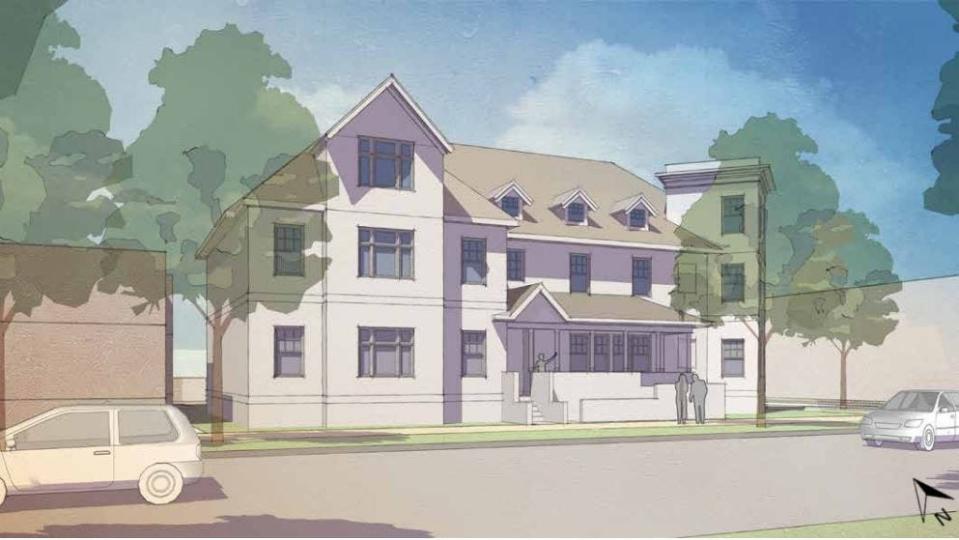With South Bend set to chip in money for 2 housing developments, subsidies raise eyebrows
SOUTH BEND — The city is moving forward with support for two projects that would convert vacant parcels on the west side into small-scale housing developments.
But a difficult housing market means the city would pay for a large portion of both projects with federal relief money, raising questions at a Thursday meeting of the South Bend Redevelopment Commission about how large affordable-housing subsidies should be.
The South Bend Heritage Foundation is proposing a six-unit apartment building at the northwest corner of West Washington and Taylor Streets, just across from Tippecanoe Place restaurant in the Near West Side neighborhood.
Historic reuse:South Bend repairs historic building in hope that developer will revive the site
And Michigan-based Allen Edwin Homes has tentative plans to build 10 single-family homes at the intersection of Marion Street and Leland Avenue in the Near Northwest neighborhood.
Both projects are contingent on the city contributing American Rescue Plan money that officials set aside to subsidize affordable housing. And as part of a development agreement, the South Bend Redevelopment Commission, which owns the vacant lots, would sell them to the developers for $1.
The developers each requested $750,000 in ARP dollars from a fund to which the city allotted $2.5 million, according to Director of Community Investment Caleb Bauer. Bauer said developers who will receive ARP money are to be announced in the next few weeks. Four other developers requested money from the same fund.
Commission member Eli Wax, who also represents the 5th District on the South Bend Common Council, raised concerns about the hefty subsidies on offer.

In the case of South Bend Heritage Foundation, the city would cover half of the construction cost if it contributes the full $750,000. The city would pay for about a quarter of the Allen Edwin Homes project.
“I don’t believe that we’re in the business of actually developing and building housing,” Wax said. “We’re in the business of working with other people to help facilitate that.”
'Missing middle housing':How South Bend looks to promote small-scale multi-family housing in neighborhoods
The Redevelopment Commission's aim is to reduce blight in the city by promoting development on underused land. A related goal is to expand the tax base and create new jobs.
Bauer said housing-market challenges make it increasingly difficult for community developers like SBHF to break even, especially in the Near West Side and the Near Northwest neighborhoods.
Both areas have lost half of their population since the 1960s, when large manufacturers like Studebaker began to close. Disinvestment and falling property values followed, creating gaps between the cost of construction and a property’s appraised value.

“When we’re looking at low-income housing and building it in areas where the housing market is not as healthy,” Bauer said, “it does require us to potentially look at some higher percentages of subsidies just to get those projects off the ground.”
New developments also mean a source of tax revenue for the city, as opposed to untaxed, unused lots owned by the city.
Bauer said subsidy percentages and tax breaks are typically lower for private projects, but the infusion of federal money allows the city to lend more support.

The West Washington site eyed by South Bend Heritage Foundation offers an example of the troublesome appraisal gap. The lot has been vacant for about 15 years, when the city demolished a group of run-down rentals there.
The nonprofit developer would build a “mansion apartment house” in Romanesque Revival style to complement the grandeur of Tippecanoe Place and nearby buildings. The multi-family home would offer a mix of market-rate and affordable units with 1-3 bedrooms.
SBHF would invest $750,000 to match the city’s contribution, bringing total construction costs to $1.5 million. But the developer expects the appraised value to be from $530,000 to $700,000 — far lower than the cost of building the apartments.
In its proposal, SBHF said banks consider the city’s investment a key factor in assessing risk when making construction loans. The nonprofit developer also said building costs are up 15% across the board for its current projects.
Allen Edwin Homes’ $2.2 million investment on Marion Street would bring 3- to 4-bedroom houses, two of which will limit rents to serve households earning up to 80% of the area median income while the remainder would be priced for households up to 120% of the AMI.
Among South Bend families, median household income sits around $46,000, according to census data. A 2021 residential market study conducted by Zimmerman/Volk found that nearly 45% of South Bend households make annual incomes of at least $50,000, up from 30% in 2013.
Wax and other commissioners ultimately agreed to support both uses of federal ARP money. Formal development agreements with the city are to be voted on at future RDC meetings.
The proposals come in response to a packet full of development blueprints that city planners released in November for seven spots across the city.
“By actually drawing it and putting a vision to that,” Director of Planning Tim Corcoran said, “I think it really helps the development community look at something and say, ‘I can do that.’”
Corcoran said the city’s request for proposals yielded five total ideas. Three won’t be pursued as part of this request.
Email South Bend Tribune city reporter Jordan Smith at JTsmith@gannett.com. Follow him on Twitter: @jordantsmith09
This article originally appeared on South Bend Tribune: South Bend sets aside American Rescue Plan money for affordable housing

